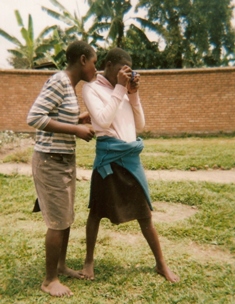Through the eyes of rural Rwandan Girls’ and Women’s strategies for engendering poverty reduction programs

This 3 years study funded by Social Sciences and Humanities Research Council of Canada is housed within the Institute of Gender, Sexuality and Feminist studies at McGill University. The study is part of a larger project by the interdisciplinary and cross-sectoral team, focusing on the social and economic empowerment of rural girls and women in Rwanda, South Africa and Ethiopia.
Research Team
McGill University:
Myriam Gervais (PI), Claudia Mitchell,
Eliane Ubalijoro
National University of Rwanda: Euthalie Nyirabega
University of KwaZulu-Natal: Naydene DeLange
Overview of study
This research project aims to identify lessons, challenges and opportunities for enhancing gender equality, and to reveal ways of rethinking current poverty strategies through the inclusion of women in development processes. As such, it draws upon an interdisciplinary approach, utilizing participatory visual methodologies to analyze key issues through the experiences of rural girls and women, using rural Rwanda as a case study. In particular, the study will make use of photovoice, an approach which involves using cameras and photographs, as a way to give girls and women a voice in addressing the issues. Rural girls’ and women’s direct involvement, we anticipate, will help map out the complexity of cross-sectoral issues and will serve to record their concerns, their choices and their practical solutions for enhancing poverty reduction strategies.
The main outcomes from this research project are to:
- Provide data, evidence and analysis of girls’ and women’s concerns, their choices and their critical role in grassroots policy making and poverty reduction programs.
- Inform development and social policies and the allocation of resources to improve rural Rwandan girls’ and women’s lives.
- Provide theoretical insights for other contexts or situations which are comparable elsewhere in Africa.
- Highlight the ways in which participatory methodologies can provide different data and alternate interpretations and insights regarding gender sensitive agendas.
- Reinforce networking and partnerships between Canadian and African Feminist Scholars.
- Train new researchers in Canada and in Rwanda in the use of participatory visual methods and on gender-based-analysis, especially within a development context.
The project will also enable senior and young researchers from diverse disciplines to converge around the Institute for Gender, Sexuality, and Feminist Studies’ research axis of equity and justice.
Key words
Rural female poverty, gender barriers, participatory visual methodologies, tacit knowledge, engendering development, poverty reduction strategies, Africa, Rwanda
For further information contact: myriam.gervais [at] mcgill.ca (Myriam Gervais)